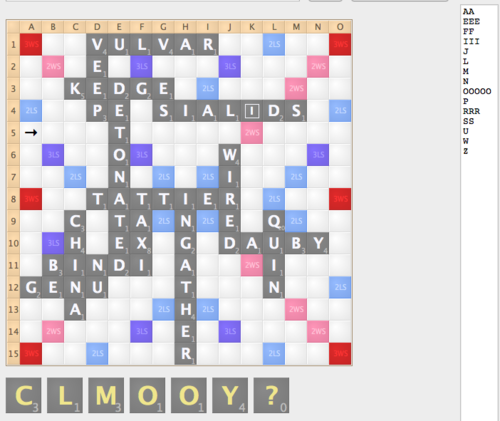Below you will find pages that utilize the taxonomy term “Scrabble”
Why I didn't win the 2025 Scrabble Players Championship
Wednesday, Sep 3, 2025
Beyond Leave Tables: A State-of-the-Art CNN Static Evaluator for Scrabble
Saturday, Jun 21, 2025
WordVault - a new spaced repetition web app for learning words
Sunday, Oct 13, 2024
Exhaustively solving Scrabble endgames using chess programming techniques
Wednesday, Jun 14, 2023
Scrabble is nowhere close to a solved game
Sunday, Feb 13, 2022
Macondo Dev Blog - simming
Sunday, Mar 22, 2020
I’m going to log more of my progress on the apps that I wrote about in an earlier post, in an attempt to:
- make myself more likely to work on these apps
- write a log for me and others and drum up some excitement! ;)
Monte Carlo simulation is basically working on Macondo. I expect that since I just got it working, that I’ll discover some bugs and special cases, and there’s so much more I want to do with it, but for now I’m excited that I got it working. As a nod to Scrabble expert Ron Tiekert, who might have been the first person to invent Scrabble simulations back in the 1980s, I plugged in the rack that he used to explain this concept, AAADERW.
Breaking the Zyzzyva encryption
Saturday, Jun 20, 2015
The article here sums up pretty well the debacle that North American tournament Scrabble players have been faced with since the introduction of the new Tournament Word List in April of 2015:
Major Scrabble Brouhaha: Can You Copyright a List of Words? _In the 1980s, when Brian Sheppard created a computer program that played Scrabble, he typed in a lot of words-more than…_www.slate.com
Basically, Hasbro or Merriam-Webster or both decided to take the volunteer work various Scrabble players did in putting together a new word list, slapped a copyright on it, and made it impossible for players to obtain a digital version of the word list. This rendered various study tools such as Quackle, the best Scrabble AI, close to useless. I’ve heard a few players argue: who cares if Quackle doesn’t find every last word? It will still give you pretty good plays. I’m sorry, but playing Scrabble without all the acceptable words is like playing chess without knowing how the rook moves. Not quite, but it almost feels like that. Other players argued that we kids had it easy and that back in the day people studied by poring through the physical copy of the book. This is a ridiculous argument; computer study methods such as Leitner spaced repetition or even my own site Aerolith make it much easier to search for and remember words than looking through a giant book.
